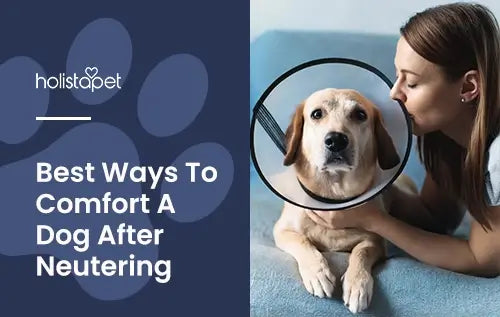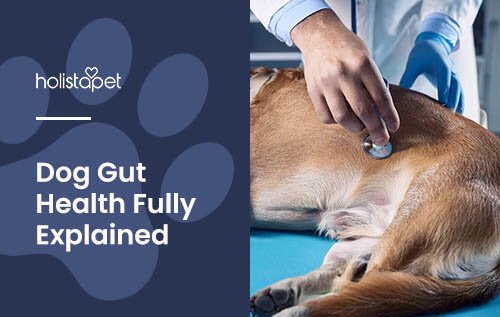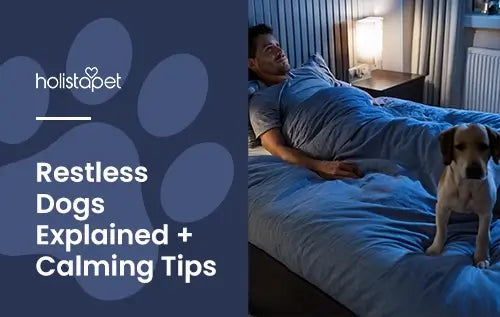Bringing your dog home after neuter surgery can feel overwhelming, but don't worry. You've got this! If you’re wondering, "How do I comfort my dog after neutering?" Start by focusing on love, patience, and a little creativity.
Your dog's recovery doesn't have to be stressful when you're armed with the right tips and tricks. Your beloved pet may feel a little out of sorts, but with some TLC, you'll have them back to their happy self in no time. Let's look at all the ways you can make your pup's healing journey a smooth and cozy experience.
What To Expect After Neutering
Neutering is one of the most common veterinary medical procedures. It helps control the pet population, prevent unwanted puppies, and provide some health benefits to our canine friends.
Neutering male dogs involves the surgical removal of the testes, which reduces animal aggression and marking tendencies. For female dogs, there's spaying, which removes the ovaries and uterus, preventing heat cycles and the risk of certain health issues.
It's natural for pet parents to wonder what comes next after these surgical procedures. After surgery, your furry friend might not act like their usual self for just a few days. This is completely normal.
There's a lot happening as their body heals, from a little grogginess to reduced energy levels. But don't fret; most dogs bounce back quickly. Recovery involves a few minor restrictions, like keeping them calm and monitoring the incision site daily.
Common Post-Surgery Behaviors in Dogs
When you get your dog fixed, they may display certain behaviors as they recover. Here's what you might notice:
- Grogginess or Drowsiness. The effects of general anesthesia can linger, making your pup seem sleepy or less alert for about a day.
- Decreased Appetite. It's normal if your dog eats less than usual during the first 24 hours after surgery.
- Mild Whining or Whimpering. This could be due to discomfort as they adjust post-surgery.
- Licking the Incision Site. Dogs instinctively try to clean themselves, but you should discourage this to promote healing.
- Limited Movement. Your pup might avoid jumping or running as their body naturally rests and heals.
How Long Does Recovery Take?

Most dogs start feeling like their usual self in about a week, though full recovery may take a bit longer. Male dogs often heal faster since neuter surgery is less invasive than spaying. For female dogs, recovery might take closer to 10-14 days.
During this time, keeping your furry friend indoors and limiting activity is key. Following your vet's instructions carefully will guarantee a smooth recovery and minimize any risks involved.
How to Comfort Your Dog After Neutering
From gentle cuddles to providing the right recovery tools, you can help your pup feel safe and loved during this time. Start by carefully following your vet's instructions. They will guide you in managing your pet's recovery the right way.
Add a dose of extra care by monitoring your dog's incision site daily and using an Elizabethan collar if needed. With your love and attention, your furry friend will feel supported and ready to heal.
Creating a Cozy and Calm Recovery Space
Choose a comfy spot indoors where your dog can relax away from other pets and distractions. A cozy bed or a recovery suit can make a world of difference in keeping them comfortable.
Keep the area free from hazards like stairs or furniture that might tempt them to jump. Add familiar items like their favorite blanket or toy to help them feel at ease. This little oasis will be their safe haven while they bounce back.
Providing Gentle Support and Reassurance
After you get your dog spayed, they might feel a little unsure after surgery. This is the perfect time to shower them with gentle support.
Speak to them in a soothing voice and offer reassuring pats to remind them they're safe and loved. Avoid overstimulation; just let them rest and recover at their own pace. If they seem worried or unsettled, simply being near them can make a huge difference.
Can CBD Comfort a Recently Neutered Dog?

CBD (cannabidiol) may potentially ease physical discomfort for spayed and neutered dogs. It interacts with the canine body to promote a sense of calm and relaxation, which can support recovery. CBD works with your pup's internal systems to help manage discomfort and encourage natural healing.
Unlike human pain medications, CBD is gentle and well-tolerated by most dogs, offering an alternative to more traditional methods. While not a replacement for your dog's pain medications or other common medications prescribed by vets, CBD can complement your care routine by promoting your furry pal's comfort and overall well-being.
See all Holistapet Dog Care Blogs
HolistaPet's All-Natural CBD Products for Dogs
At HolistaPet, we offer a wide range of CBD products designed to support your canine friend's recovery in the most natural way possible. There's something for every pup, from dog CBD oil to soft chews, crunchy treats, and capsules.
Our products use broad-spectrum CBD combined with other soothing ingredients to provide gentle relief and promote relaxation. They are also vegan-friendly, all-natural, and tested by third-party labs for quality and safety.
Whether your pup prefers a tasty treat or a quick drop of oil, we have the perfect option to keep them calm and supported as they heal. Check out our online shop today to score some great products!
Recognizing Signs of Complications
It's important to keep an eye out for signs that something isn't right. If you notice any of these symptoms, it's time to reach out to your veterinarian for further advice:
- Excessive Swelling or Redness at the Incision Site. A little puffiness is normal, but anything extreme could indicate an issue.
- Persistent Whining or Agitation. If your dog seems unusually upset, it might be a sign of discomfort or complications.
- Lethargy Beyond a Few Days. While rest is normal, prolonged low energy could mean trouble.
- Loss of Appetite for More Than a Couple of Days. Most pets regain their appetite quickly. Ongoing refusal to eat is a red flag.
- Discharge or Foul Odor from the Incision. These could signal infection and require immediate attention.
When to Contact Your Veterinarian
If your dog's recovery isn't going as expected, don't hesitate to contact your veterinarian. Unusual behaviors or physical signs can indicate your pup needs extra care. It's always better to be cautious than to wait too long.
Reach out immediately if your dog shows symptoms like excessive swelling at the incision site, discharge, or extreme lethargy. Also, if they're not eating for more than a couple of days or seem to be in persistent discomfort despite pain relief measures, it's time to call the vet's office.
Tips for a Smooth Recovery
A little planning and a lot of love can go a long way in helping your furry buddy heal. Here are some practical tips to keep them comfy and on the road to feeling better:
- Follow Your Vet's Instructions Carefully. Your vet's advice matches your dog's needs, so stick to it for the best results.
- Monitor the Incision Site Daily. Check for redness, swelling, or anything unusual to ensure proper healing.
- Limit Physical Activity. Prevent jumping, running, or climbing stairs to protect the incision and promote healing.
- Use an Elizabethan Collar or Recovery Suit. These tools stop your pup from licking the incision and causing irritation.
- Provide Plenty of Water and Rest. A cozy bed and easy access to water help your dog relax and recover indoors.
Managing Activity Levels and Keeping Your Dog Rested
Keeping your dog calm and rested is key to a smooth recovery. Too much movement, like jumping or climbing stairs, can irritate their incision site or slow down healing. Create a safe, quiet space where they can relax without distractions from other animals or the temptation to play too soon.
Short, supervised potty breaks are fine, but avoid letting them run or engage in high-energy activities. Using tools like an E-collar or a recovery suit can help manage their activity levels and prevent any accidental mishaps. A little rest now contributes to a quicker return to their playful self later!


 CBD Oil for Dogs - Fast Acting
CBD Oil for Dogs - Fast Acting
 Chicken Flavored CBD Oil For Dogs - Easy Dose
Chicken Flavored CBD Oil For Dogs - Easy Dose
 Salmon Flavored CBD Oil For Dogs - Highly Rated
Salmon Flavored CBD Oil For Dogs - Highly Rated
 CBG Oil for Dogs and Cats - Loved by Thousands
CBG Oil for Dogs and Cats - Loved by Thousands





Leave a comment
All comments are moderated before being published.
This site is protected by hCaptcha and the hCaptcha Privacy Policy and Terms of Service apply.